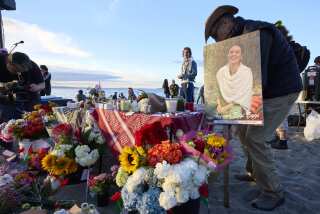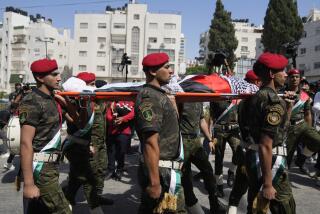A Dynamic Advocate Is Now a Statistic
- Share via
MOSUL, Iraq — The State Department cable from Iraq betrayed a hint of emotion rare in diplomatic communiques.
“An extraordinary woman,” said the message to Washington. “Bold and daring, she was unstoppable. Until today.”
That morning early this month, gunmen had ambushed Iraqi human rights advocate Nafia Aziz and her 24-year-old son, Ahmed, on a street in Mosul. Mother and son died together in the car.
To many, the 49-year-old Aziz symbolized hope for progress in this northern city. Self-assured in the company of generals and comfortable around prisoners, she worked to improve conditions for those being held by Iraqi police and the U.S. military.
In a city where U.S. troops often find themselves unable to communicate with the local population, challenged by language and cultural differences, Aziz was a bridge between Americans and Iraqis. In the fortified palace now held by foreign troops in her hometown, she disarmed wary soldiers and State Department officials with her vivacious personality.
On Oct. 3, she became yet another statistic in the bloodshed, joining scores of local politicians, election workers and journalists who have been killed in recent months by unknown gunmen, believed by some residents to be connected with Iraqi security forces. Few attackers have been brought to justice.
Residents charge that security forces here, as in other parts of the country, have been infiltrated by tribesmen and militia members. Kurdish peshmerga soldiers often sport Kurdish flags on their Iraqi army uniforms while patrolling the streets of Mosul, raising questions about their allegiance.
When insurgents overran the city last year, the entire police force fled. It has since been replaced in large part by clansmen loyal to the new police chief, a Sunni Arab who hails from a city near Tikrit.
The day before she was killed, Aziz wrote a report critical of the chief, Mohammed Ahmed Jabouri. The Kurdish-dominated provincial government recently voted unanimously to oust him, alleging heavy-handed behavior and corruption. But American commanders intervened, saying it would destabilize the city before last Saturday’s referendum on Iraq’s proposed constitution.
Aziz, a Sunni, was a member of the provincial council on a Kurdish political slate. She was an outspoken woman who challenged local authorities, said a U.S. intelligence officer who requested anonymity because the investigation into her death was continuing.
“There are many people in this city who had a motive to kill her,” the officer said.
Witnesses said that after a tall masked man shot Aziz, he took her briefcase, cellphone and the AK-47 her son had carried to protect his mother.
“My mother always said that she was not afraid of terrorists but the police,” said her daughter, Maha Aziz. “We tried to stop her from working because we were worried.”
Nafia Aziz knew that by working with the Americans she was risking her life. One of her brothers had been killed because he worked with U.S. troops, and a bomb recently exploded outside her house. She told friends that the blast was a warning.
But Aziz was undeterred. Unlike other members of the council, the petite woman with apple cheeks kept a high profile, appearing on television and radio talk shows to advocate her favorite causes: prisoners’ rights and public health. When visiting the U.S. military’s Forward Operating Base Courage, she often challenged American commanders over chocolate chip ice cream at the mess hall.
After the fall of Saddam Hussein’s regime in 2003, Aziz joined the Patriotic Union of Kurdistan because she thought the party had “a clear ideology,” a family member said. “By joining the party, she was expecting to achieve her aspiration as a woman.”
Her husband, a watchmaker 18 years her senior, had taken another wife. But he and their five children were largely supportive of her political work, relatives say. The modest salary she received for her council work supported her three daughters in college.
Aziz counted Brig. Gen. Kevin Bergner, the deputy commander of the 20,000-member multinational force here, among her friends. She called him her “brother.” The two visited prisoners together, going as far as Abu Ghraib near Baghdad.
To prisoners, she was a comforting, maternal presence.
“She would walk into a jail and at once be in charge and compassionate,” he said early this week. Though they did not always agree, he said, he admired her.
“She had a combination of humility and courage,” he said. “She didn’t do it for Nafia Aziz.”
Days before her death, Aziz met with Staff Sgt. Krista Englert of the 401st Civil Affairs Battalion and three other female soldiers to talk about future projects. Aziz was planning to build a women’s center in Mosul and had been sponsored by the State Department to visit Washington.
“Working with her was like going Mach 3,” Englert said. “If Nafia didn’t like how a prison was being run, her first reaction wouldn’t be to come to me for help, but to ask the guy in charge, ‘Hey, why are you doing that?’ ”
“She is my Iraqi mom,” Englert said, slipping into present tense. “Sometimes she was the only good thing I thought about this place.”
In one of the pictures on Englert’s computer, Aziz sits smiling at the head of a conference table, wearing a stylish head scarf with bold white dots.
“She reminded me of Jackie O,” said Englert, 31, a nurse and former firefighter.
When Englert’s commander told her that Aziz had been killed, “I lost all military bearing,” she said. The slaying “left me with a horrible, sick feeling about this place.”
“She was a lot of my drive,” she added, “and it’s hard not to lose that drive.”
*
A Times special correspondent in Mosul contributed to this report.
More to Read
Sign up for Essential California
The most important California stories and recommendations in your inbox every morning.
You may occasionally receive promotional content from the Los Angeles Times.













